How to Improve Alzheimer Sleep Quality and Reduce Sleep Disturbances
Sleep disturbances are common among Alzheimer’s patients, affecting not only their quality of life, but also the well-being of their caregivers. But what if there was a way to improve Alzheimer sleep quality and reduce disturbances for those living with dementia without relying solely on medications
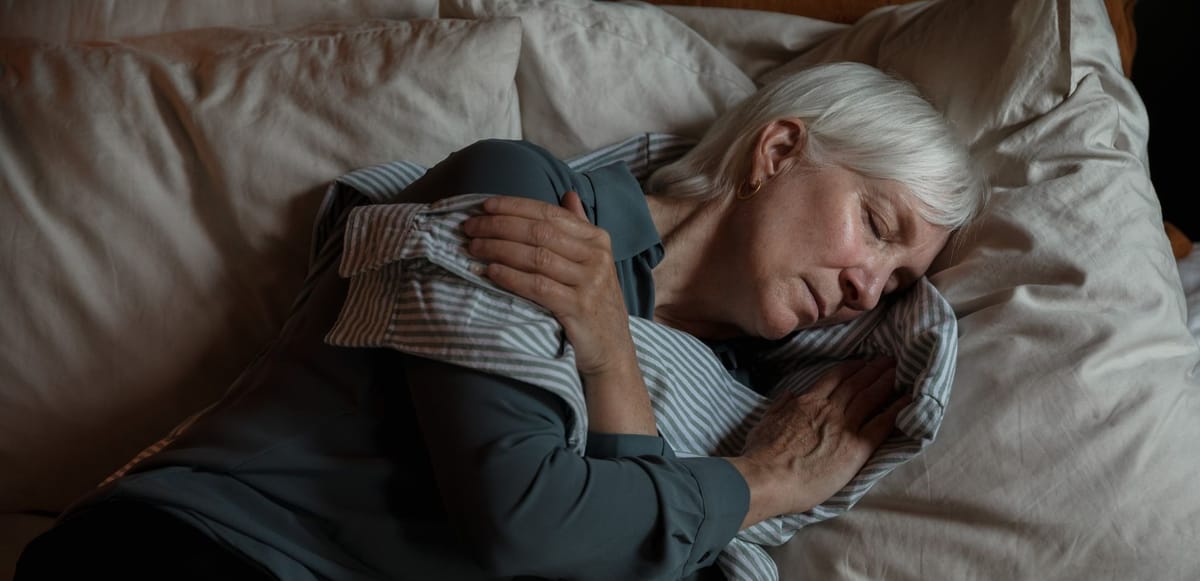
Sleep disturbances are common among Alzheimer’s patients, affecting not only their quality of life, but also the well-being of their caregivers. But what if there was a way to improve Alzheimer sleep quality and reduce disturbances for those living with dementia without relying solely on medications? In this blog post, we’ll explore the causes of sleep disturbances in Alzheimer’s patients, common sleep disorders, and practical non-pharmacological strategies to create a better night’s rest for both patients and caregivers alike.
Short Summary
- Understand causes of sleep disturbances in Alzheimer’s patients
- Create a consistent sleep routine and optimize the environment to improve quality
- Seek professional help and memory care services for managing symptoms
Understanding Alzheimer's Sleep Disturbances
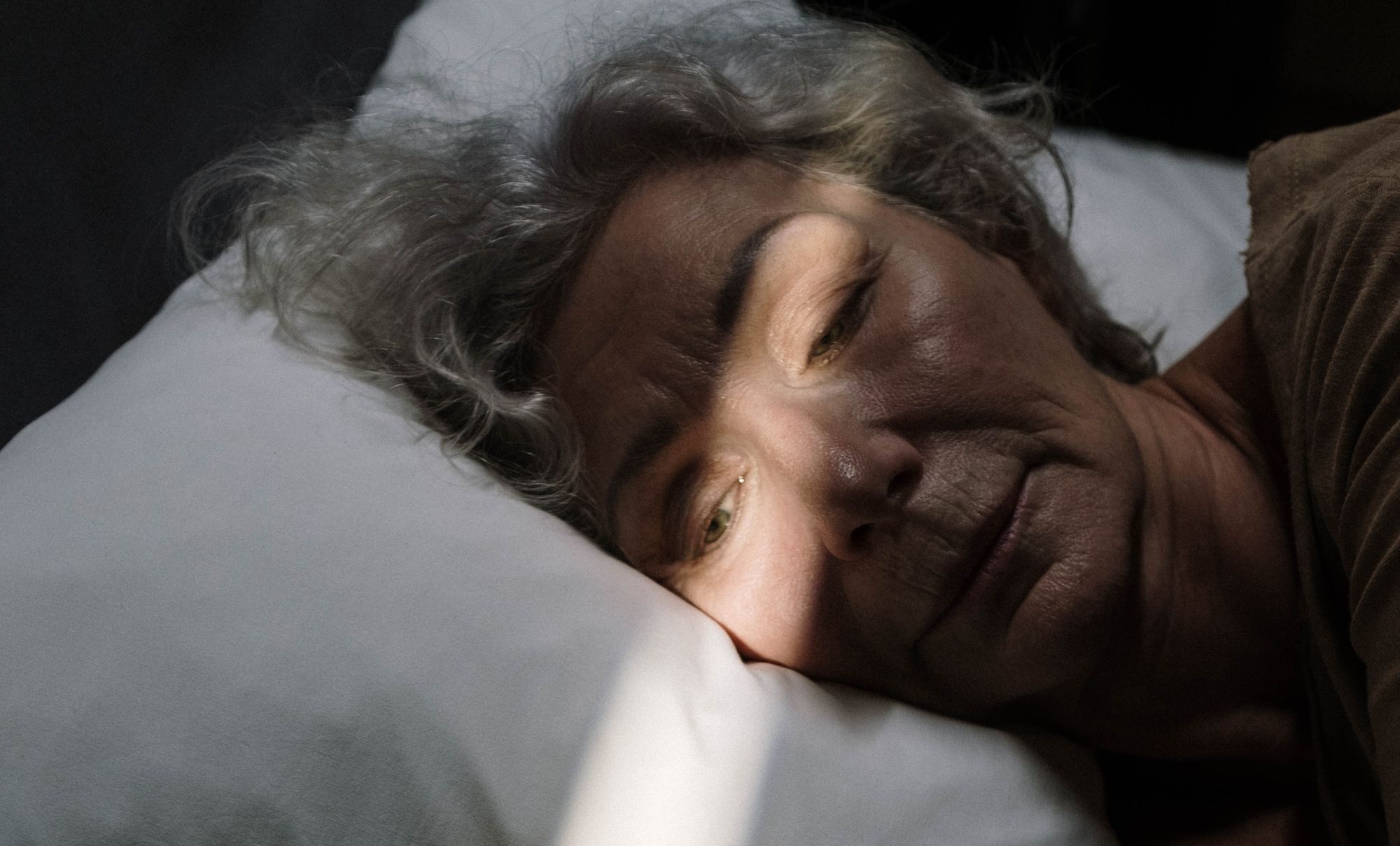
Sleep disturbances in Alzheimer’s patients are a multifaceted issue that can stem from various factors. For instance, disrupted circadian rhythms can lead to confusion between day and night, making it difficult for patients to fall asleep and stay asleep. One such sleep disturbance can be attributed to medications used to treat dementia, which may have side effects that disrupt sleep, such as night-time stimulation and dream disturbances.
Additionally, different types of dementia, like Lewy body dementia and Parkinson’s disease dementia, can cause unique sleep issues. By understanding the root causes of sleep disturbances, we can devise effective interventions to address them and improve the overall health of individuals living with dementia.
Disrupted Circadian Rhythms

The circadian rhythm, a 24-hour cycle that governs our sleep-wake cycle, can become disrupted in Alzheimer’s patients. This disruption can lead to confusion between day and night, resulting in difficulty falling asleep, staying asleep, and increased nighttime wandering. Additionally, these disruptions may affect slow wave sleep, an essential part of the sleep process.
When Alzheimer’s patients struggle to distinguish between day and night, their sleep quality suffers, leading to further sleep disturbances and potential health complications.
Medication Impact on Sleep

While medications play a crucial role in managing dementia symptoms, some can negatively impact sleep quality. For example, certain medications related to chronic alcohol use, depression, or sleep apnea may adversely affect sleep.
It is essential to evaluate and adjust medications as needed to minimize sleep disturbances in Alzheimer’s patients. A tool like the Sleep Disorders Inventory can be useful in assessing sleep symptoms during the initial evaluation and monitoring the efficacy of treatment interventions.
Specific Types of Dementia and Sleep Issues

Certain types of dementia, such as Lewy body dementia and Parkinson’s disease dementia, can cause unique sleep issues. One example is REM sleep behavior disorder (RBD), a parasomnia characterized by repeated episodes of vocalization and complex movements during sleep. RBD has been established as an early warning sign of Parkinson’s disease, dementia with Lewy bodies, and multiple system atrophy, all classified as synucleinopathies.
It is essential to recognize and address these unique sleep issues to provide targeted care for individuals with specific types of dementia.
Identifying Common Sleep Disorders in Alzheimer's Patients

In addition to dementia sleep disturbances, Alzheimer’s patients, who are dealing with Alzheimer’s disease, are also at risk for common sleep disorders like sleep apnea, restless legs syndrome, and REM sleep behavior disorder. These sleep disorders can contribute to sleep disturbances and poor sleep quality, further exacerbating cognitive decline and impacting overall health.
By identifying and addressing these sleep disorders, we can provide a more comprehensive approach to improving sleep quality for Alzheimer’s patients.
Sleep Apnea
Sleep apnea, a form of sleep disordered breathing, is characterized by intermittent pauses in breathing during sleep, often resulting in loud snoring and shallow breathing. Studies estimate that the prevalence of obstructive sleep apnea among dementia patients residing in long-term care facilities is as high as 70% - 80%.
If left untreated, sleep apnea can exacerbate cognitive deterioration and negatively impact overall health in Alzheimer’s patients.
Restless Legs Syndrome
Restless legs syndrome (RLS) is a neurological disorder that causes an irresistible urge to move the legs, often accompanied by uncomfortable sensations such as pulling, creeping, or tugging. This disorder can lead to difficulty falling asleep and staying asleep, further contributing to sleep disturbances in Alzheimer’s patients.
Proper identification and management of RLS can help alleviate discomfort and improve sleep quality.
REM Sleep Behavior Disorder

REM sleep behavior disorder (RBD) is another sleep disorder commonly observed in Alzheimer’s patients. RBD is characterized by the manifestation of dream-enacting behaviors during REM sleep, which may include loud talking, shouting, and physical movements.
RBD has been linked to neurodegenerative diseases such as Parkinson’s disease, dementia with Lewy bodies, and multiple system atrophy. Proper management of RBD is crucial to ensure patient safety and improve sleep quality.
Non-Pharmacological Strategies for Improving Sleep in Alzheimer's Patients
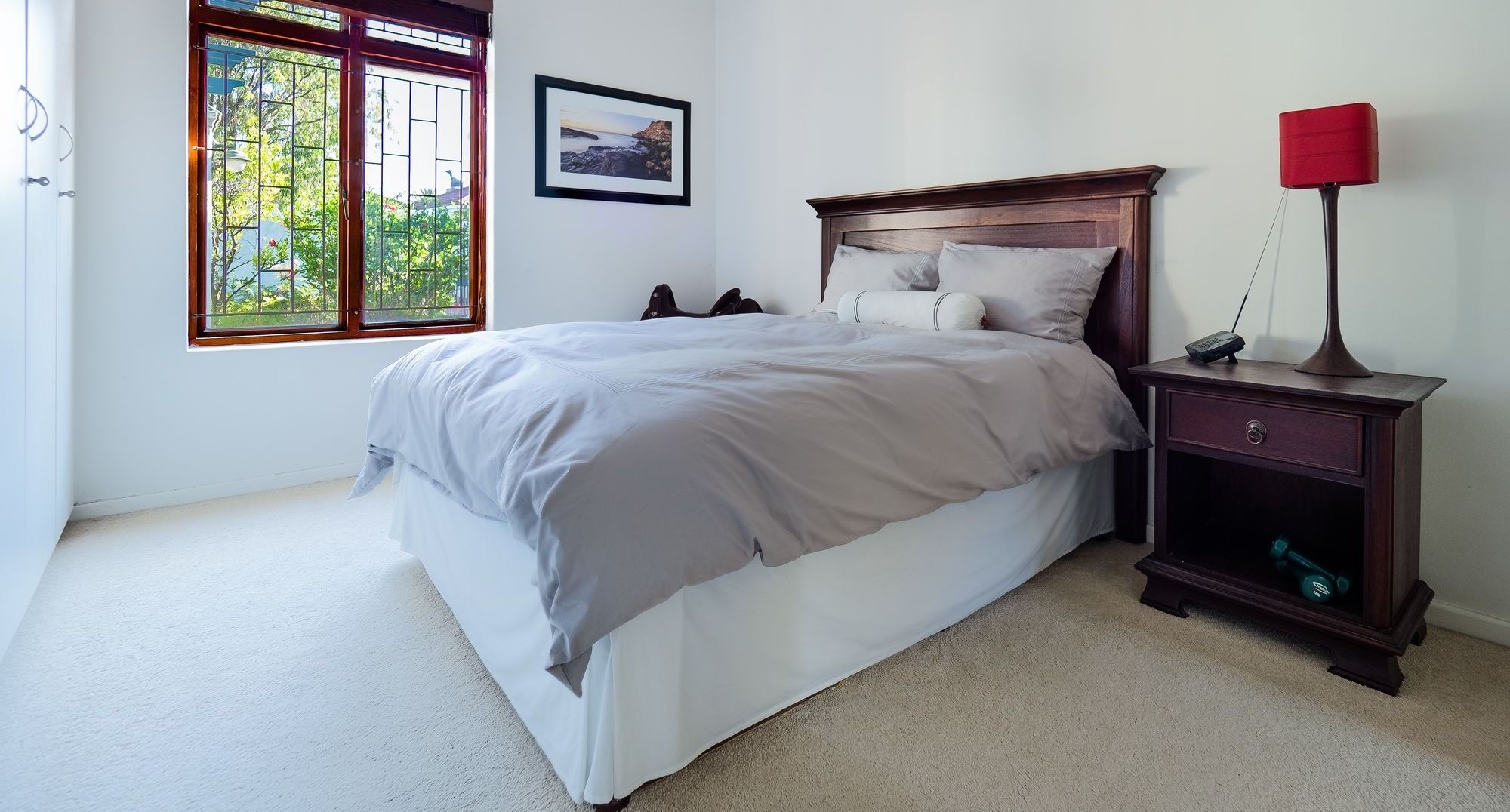
Non-pharmacological strategies can play a significant role in improving sleep quality in Alzheimer’s patients without relying on medications. These strategies may include establishing a sleep routine, optimizing the sleep environment, and utilizing relaxation techniques.
Implementing these non-drug therapies can help create a better night’s rest for both patients and caregivers, reducing stress and potentially slowing cognitive deterioration.
Establishing a Sleep Routine
Creating a consistent sleep routine with regular bedtimes and morning rituals can help regulate the sleep-wake cycle and improve sleep quality in Alzheimer’s patients. Incorporating activities such as reading, listening to calming music, or taking a warm bath before bedtime can help relax the body and mind, preparing the patient for sleep.
Consistency is key, as adhering to a sleep routine helps establish a healthy sleep-wake cycle and enhances sleep quality by maintaining regular sleep patterns.
Optimizing the Sleep Environment
Adjusting the sleep environment can also help create a more conducive atmosphere for sleep in Alzheimer’s patients. This may include ensuring a dark, quiet, and cool atmosphere free of distractions and electronics. Additionally, exposure to bright light therapy in the morning or throughout the day can lead to increased total nighttime sleep in individuals with dementia residing in nursing facilities.
By optimizing the sleep environment, we can help Alzheimer’s patients achieve better sleep quality.
Relaxation Techniques

Relaxation techniques, such as deep breathing exercises, soft music, and aromatherapy, can help Alzheimer’s patients unwind and fall asleep more easily. By practicing these techniques, individuals with dementia can achieve better sleep quality and reduce stress and anxiety levels.
It is important to note that these techniques require practice to be effective, so incorporating them into the daily routine can help maximize their benefits.
Managing Daytime Sleepiness and Napping

Managing daytime sleepiness and napping is crucial for maintaining a healthy sleep-wake cycle in Alzheimer’s patients. Excessive daytime sleepiness can disrupt nighttime sleep and lead to further sleep disturbances.
By understanding the causes of excessive daytime sleepiness and balancing naps with nighttime sleep, we can help Alzheimer’s patients achieve a more restful and restorative sleep pattern.
Causes of Excessive Daytime Sleepiness
Excessive daytime sleepiness in Alzheimer’s patients can be attributed to various factors, including medication side effects, sleep disorders, sleep deprivation, and poor sleep quality at night.
Excessive daytime sleepiness is more commonly associated with Parkinson’s disease dementia and Lewy body dementia than Alzheimer’s disease. Assessing the causes of daytime sleepiness can help tailor interventions and improve overall sleep quality.
Balancing Naps and Nighttime Sleep
Balancing naps and nighttime sleep is essential for Alzheimer’s patients, as long daytime naps can disrupt the sleep-wake cycle and lead to nighttime wakefulness. To reduce daytime naps, promoting physical activity and creating a peaceful environment for nighttime sleep can be helpful.
Establishing a consistent bedtime routine can also aid in facilitating relaxation and improving sleep quality.
When to Consider Sleep Aids and Medical Interventions
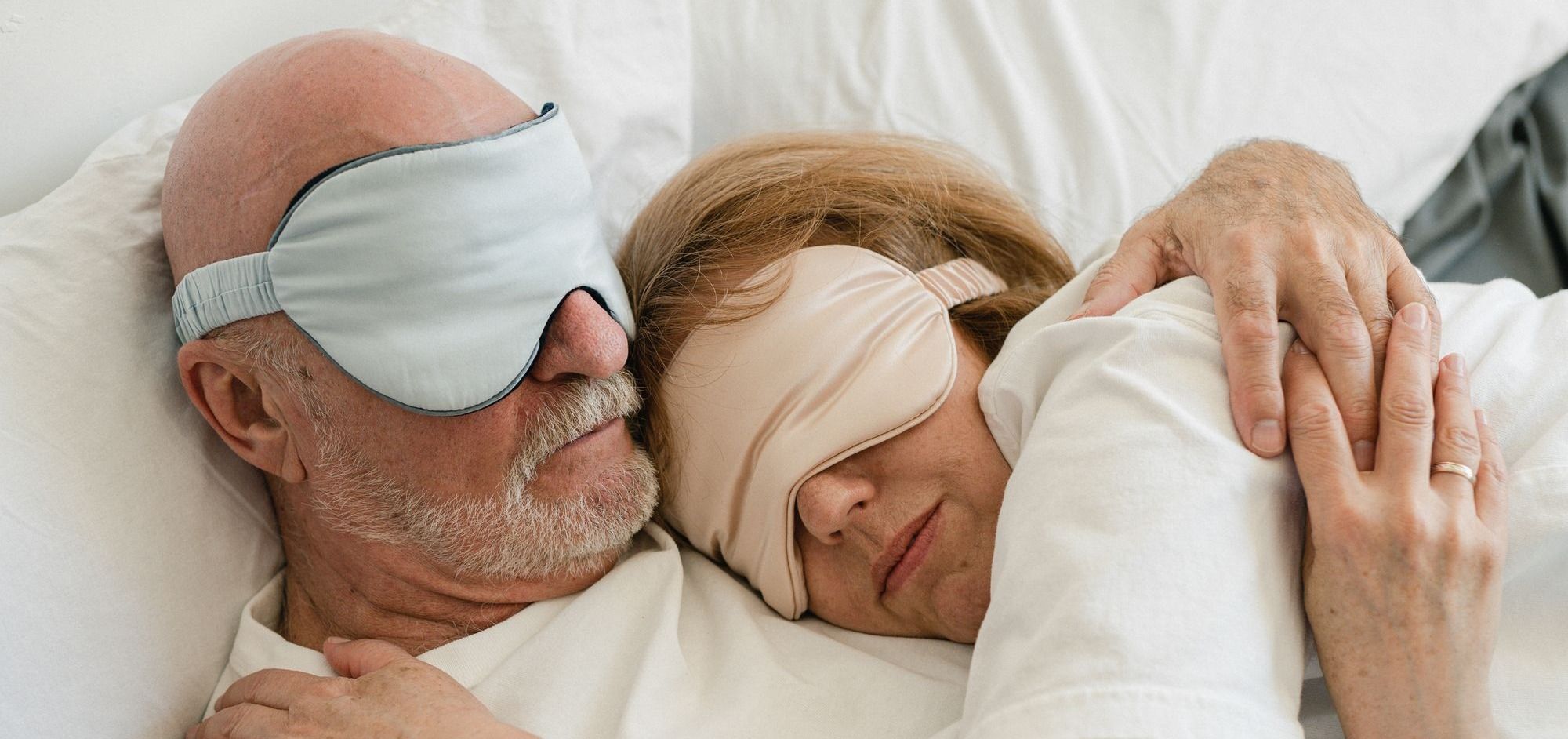
Sleep aids and medical interventions, such as melatonin supplements, should be considered for Alzheimer’s patients only after non-drug therapies have been exhausted and under medical supervision. Sleep-inducing medications should be used sparingly due to the risk of increased confusion, sedation, and falls in dementia patients.
By carefully evaluating the need for sleep aids and medical interventions, we can ensure the safest and most effective approach to improving sleep quality in Alzheimer’s patients.
Checkout this new product to help with sleep
Melatonin Supplements
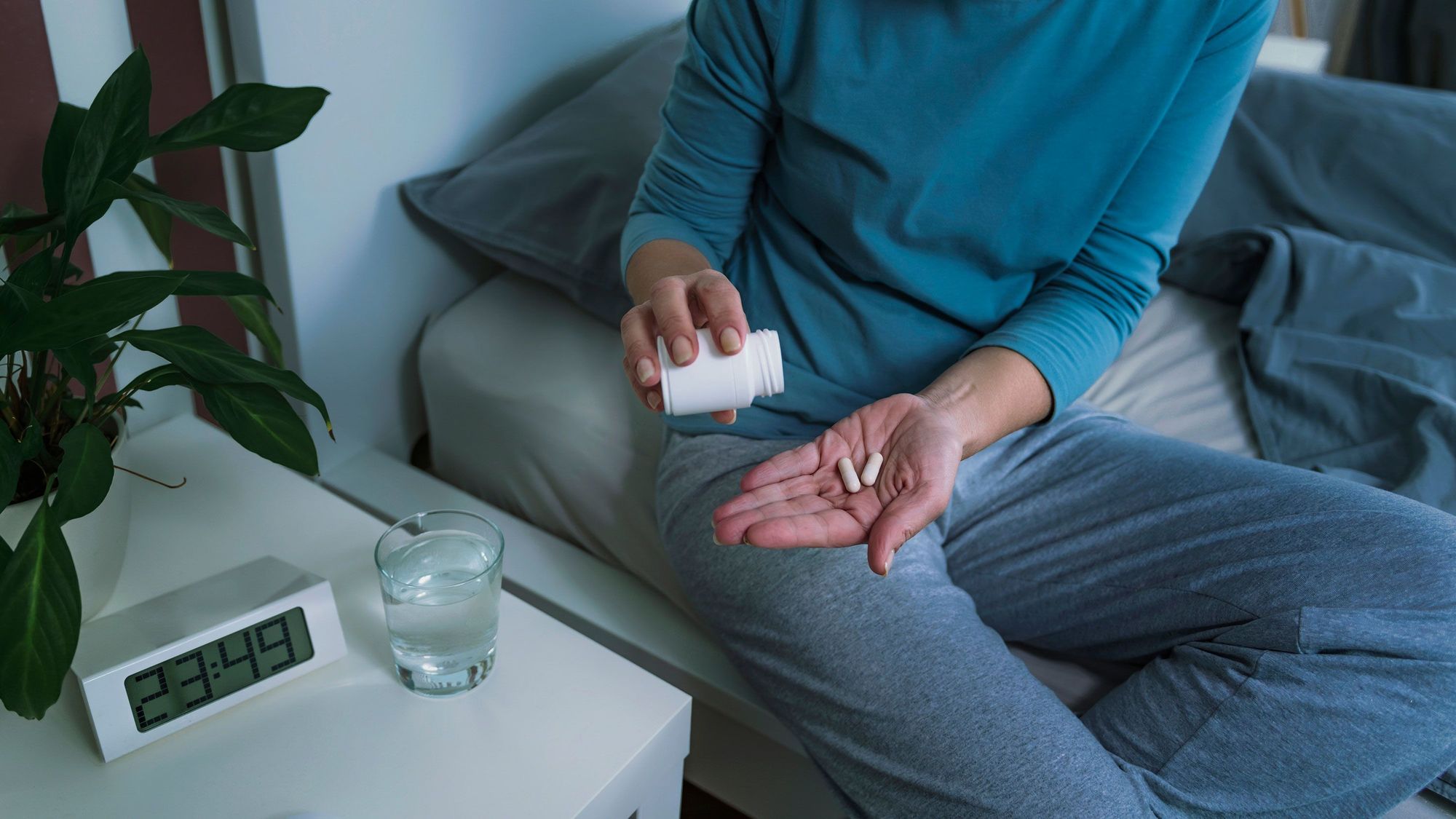
Melatonin supplements, combined with bright light therapy, may improve sleep quality in Alzheimer’s patients, but should be used with caution and under medical supervision. Melatonin is a hormone that regulates sleep-wake cycles and can be used to treat sleep disorders, jet lag, and anxiety before and after surgery.
However, melatonin supplements may result in side effects such as headaches, dizziness, and nausea. Consulting a doctor before taking melatonin supplements is crucial to ensure safe and effective use.
Medical Supervision and Sleep Aids
The importance of medical supervision when using sleep aids in Alzheimer’s patients cannot be overstated. Sleep aids should be closely monitored by healthcare professionals to observe for indications of abuse or misdirection of scheduled medications prescribed to treat insomnia and other sleep disorders.
Consulting a sleep medicine specialist can help determine the most suitable course of treatment for sleep disturbances in Alzheimer’s patients.
Caregiver Support and Resources for Managing Sleep Disturbances

Caregiver support and resources are essential for managing sleep disturbances in Alzheimer’s patients. As caregivers play a crucial role in implementing sleep strategies and monitoring patient progress, their well-being and ability to access support are vital to the successful management of sleep disturbances.
Caregivers can benefit from various resources, such as support groups, online resources, and respite care, to assist in managing sleep disturbances in Alzheimer’s patients.
Caregiver Self-Care
Self-care is vital for caregivers of Alzheimer’s patients, as sleep disturbances can be challenging to manage. By prioritizing their own well-being, caregivers can better support their loved ones and provide optimal care.
Strategies for caregiver self-care may include ensuring adequate sleep, maintaining a nutritious diet, engaging in regular physical activity, taking periodic respites from caregiving responsibilities, and seeking assistance from loved ones.
Professional Help and Memory Care

As Alzheimer’s progresses, professional help and memory care may become necessary to provide additional support for managing sleep problems and other dementia-related symptoms. Memory care can assist in abating confusion and disorientation, which can result in sleep disturbances, and enhance communication and social interaction, which can help diminish stress and anxiety.
When it becomes challenging to adequately manage the patient’s sleep issues and dementia symptoms in a home setting, seeking professional help and memory care services for people with dementia can provide much-needed support and resources.
Summary
In conclusion, sleep disturbances in Alzheimer’s patients can significantly impact their quality of life and the well-being of their caregivers. By understanding the causes of sleep disturbances, identifying common sleep disorders, and implementing non-pharmacological strategies, we can help improve sleep quality for both Alzheimer’s patients and their caregivers. Caregiver support and resources are essential for managing sleep disturbances, and professional help and memory care may become necessary as Alzheimer’s progresses. With proper care and intervention, we can create a better night’s rest for those living with dementia and their loved ones.
Frequently Asked Questions
How does Alzheimer's affect your sleep?
People living with Alzheimer’s often experience severe disruptions to their sleep, including difficulty falling asleep, frequent night-time awakenings, sleep fragmentation and excessive daytime sleepiness.
Reduced levels of melatonin, damage to the body clock, changes in brain activity, and disturbances such as nocturnal wandering can all contribute to disrupted sleep.
What stage of Alzheimer's is sundowning?
Sundowning is a distressing symptom that affects people in mid to late-stage Alzheimer’s and other forms of dementia. It can start as early as the middle stages and worsen as the condition progresses until it tapers off towards the end.
What is the best sleep pill for dementia patients?
Belsomra® is the best sleep pill for dementia patients, as it is FDA approved and inhibits the activity of orexin, a neurotransmitter involved in the sleep-wake cycle.
Melatonin may also be prescribed, though clonazepam may worsen other dementia symptoms and leave the person feeling drowsy during the day.
What are some non-pharmacological strategies for improving sleep in Alzheimer's patients?
Establishing a sleep routine, optimizing the sleep environment, and using relaxation techniques are all effective non-pharmacological strategies to improve sleep in Alzheimer’s patients.
These strategies can help reduce the amount of time it takes to fall asleep, increase the amount of time spent in deep sleep, and improve overall sleep quality.
It is important to note that these strategies should be tailored to the individual patient’s needs.
How can disrupted circadian rhythms affect sleep quality in Alzheimer's patients?
Disruption of the circadian rhythm caused by Alzheimer’s disease can lead to difficulty falling asleep, staying asleep, and increased nighttime wandering, greatly affecting sleep quality.
These disruptions can have a significant impact on the quality of life of those affected by Alzheimer’s, as well as their caregivers. Poor sleep can lead to increased fatigue, irritability, and difficulty concentrating, all of which can further complicate the challenges.
You might also like this article:







